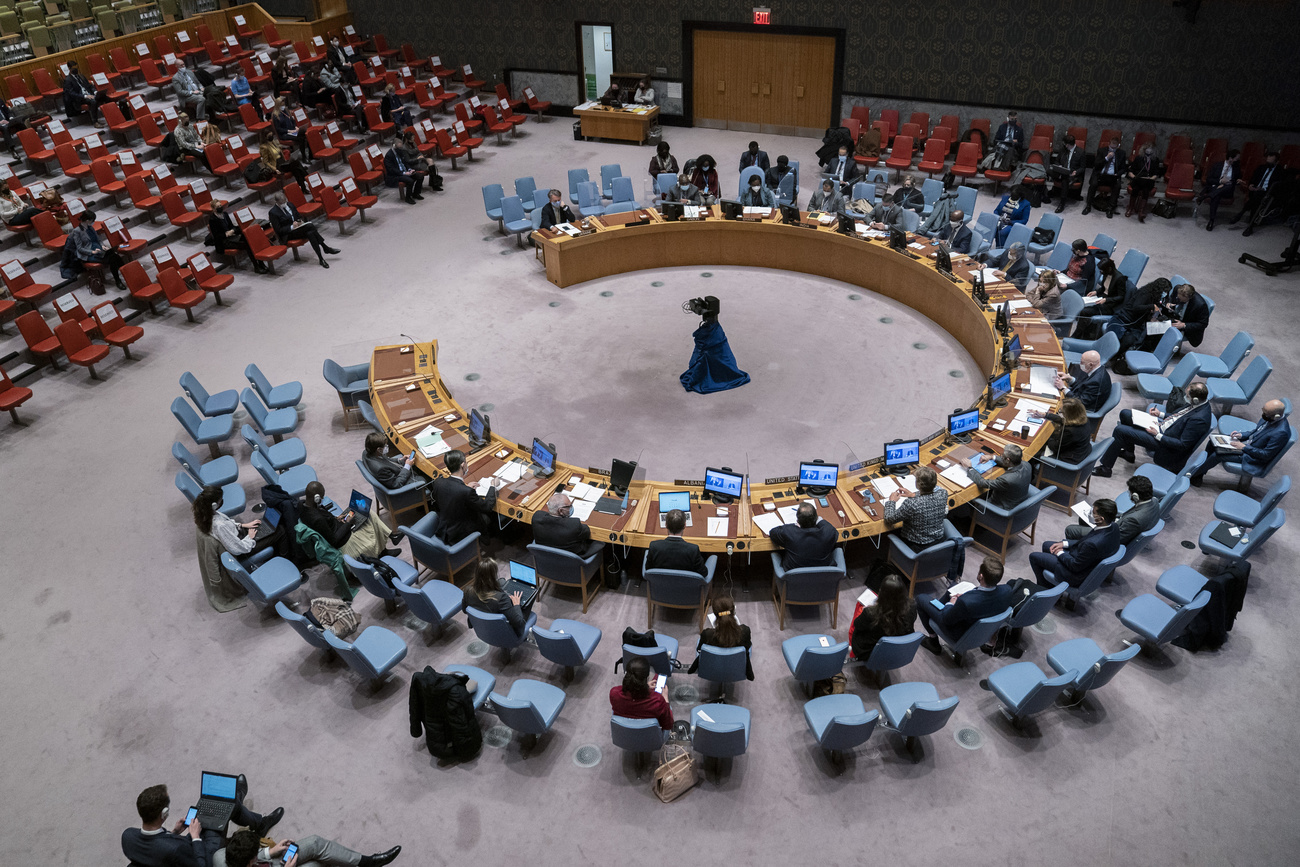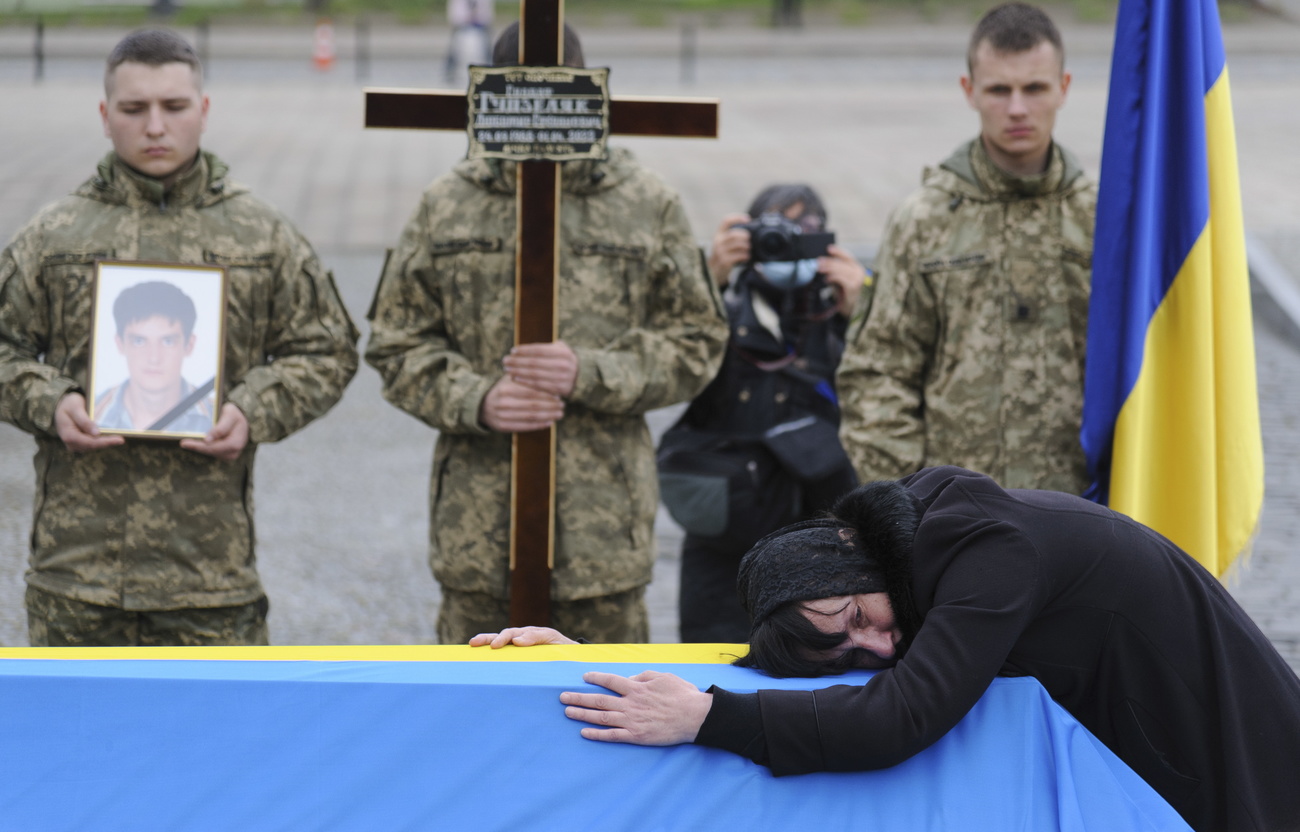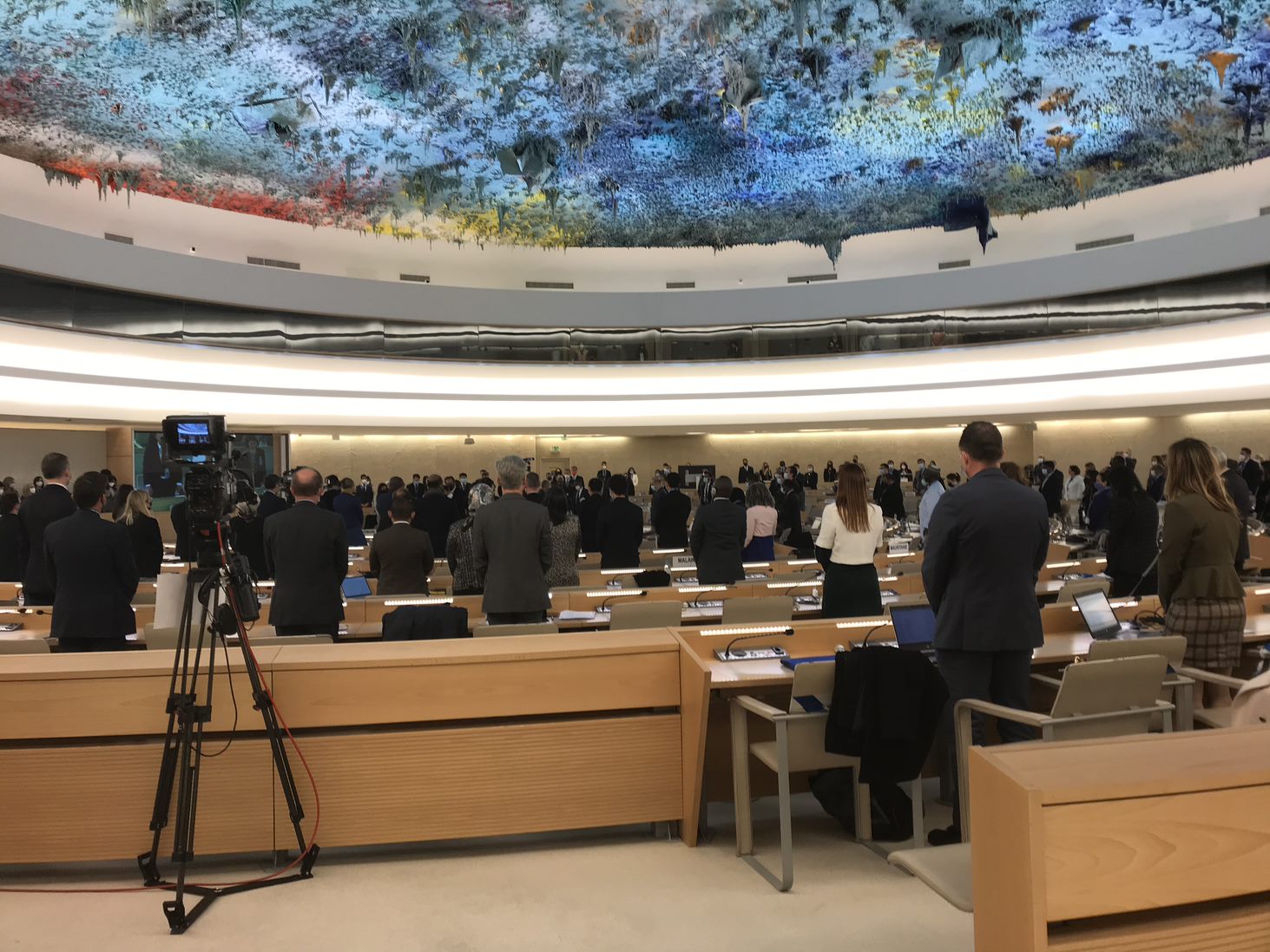
Russia’s war in Ukraine highlights UN fault lines

Western nations have remained remarkably united in their response to Russia’s invasion of Ukraine on February 24. But in other parts of the world, the war has highlighted fault lines and shifting allegiances, which could have a wider impact on global politics and the United Nations, including in Geneva.
While Europe, the United States, Canada, Australia and Japan have strongly condemned Russia’s war in Ukraine, many nations don’t really want to choose sides. China, apparently, is one of them, along with India, the Gulf states and many African countries. But faced with various UN votes on Russia’s invasion of its neighbour (see infobox below), some have already shifted position. The United Arab Emirates and Senegal, for example, first abstained but then subsequently voted in favour of condemning Russia. China and India consistently abstained. The UN General Assembly votes are the only ones where all 193 UN member countries could vote, with no state having a veto power, as in the UN Security Council.
On the Swiss side, after some initial hesitation in Bern over Switzerland’s traditional neutrality, the government joined the sanctions measures against Russia adopted by the European Union.
UN Security Council, February 25
Members: 15, including five permanent members with a veto (US, UK, France, China, Russia). Current non-permanent members: Albania, Brazil, Gabon, Ghana, India, Ireland, Kenya, Mexico, Norway, United Arab Emirates (UAE).
Result: Vetoed by Russia. Eleven voted for the resolution. China, India and the UAE abstained.
UN General Assembly, March 2
193 member states, no veto powers.
ResultExternal link (link includes full breakdown): Adopted by 141 in favour, five against (Russia, Belarus, Syria, North Korea, Eritrea) and 35 abstentions. Twelve countries did not vote at all.
Note: The UAE voted in favour this time. Myanmar and Afghanistan voted in favour, but their UN representatives are from the former governments.
AbstentionsExternal link included China, Cuba, India, Iran, Pakistan, Bangladesh, Sri Lanka, South Africa, Sudan and Senegal (current chair of the African Union). Forty-five percent of the abstentions were African states.
UN Human Rights Council, March 4
47 members
Result: Adopted by 32 in favour, two against (Russia and Eritrea) and 13 abstentions (Armenia, Bolivia, Cameroon, China, Cuba, Gabon, India, Kazakhstan, Namibia, Pakistan, Sudan, Uzbekistan, Venezuela). Note: This time Senegal voted in favour, as did the UAE.
UN Security Council, March 23
The 15-member Security Council failed to adopt a resolutionExternal link introduced by Russia demanding humanitarian access in Ukraine (but which did not mention the Russian aggression). Only Russia and China voted in favour, while the other 13 members abstained.
UN General Assembly, March 24
The 193-member UN General Assembly adopted by an overwhelming majority a resolution demanding civilian protection and humanitarian access in Ukraine. It also criticised Russia for creating a “dire” humanitarian situation following its invasion. The resolution was passed by 140 votesExternal link, with five against – Russia, Belarus, North Korea, Syria and Eritrea – and 38 abstentions (link includes full breakdown of votes).
UN General Assembly, April 7
The United Nations General Assembly suspended Russia from the Geneva-based UN Human Rights Council over reports of “gross and systematic violations and abuses of human rights” by invading Russian troops in Ukraine.
The vote on April 7 garnered 93 votes in favour – including from Switzerland – while 24 countries voted no and 58 countries abstained. A two-thirds majority of voting members (abstentions do not count) was needed to suspend Russia from the 47-member council.
Asia
While Japan has staunchly backed the “Western” position, some countries in Asia have not. Eyes have been especially on China and India, which have both abstained in UN votes condemning the Russian invasion.
“Given China’s relations with Russia and its relations with the West, I think China’s abstention is only to be expected,” says Gopalan Balachandran, professor of international history and politics at the Graduate Institute in Geneva. Chinese President Xi Jinping and Russian President Vladimir Putin made clear in a joint statement on February 4 that they agree to “oppose further enlargement of NATO”. Antoine Bondaz, a researcher at the Paris-based Fondation pour la recherche stratégique (FRS), says China and Russia do not see each other as threats “and are united to discredit the West. China is putting its political interests before its economic interests”. Beijing also wants to increase its influence with developing countries more than with the West, he told SWI swissinfo.ch.
China’s foreign minister, Wang Yi, made a surprise visit to India at the end of March, which is part of its diplomatic narrative, according to Bondaz. “It wants to show the world that the West is isolated, and that India is supporting China and Russia.”
India has abstained from condemning Russia at the UN on five occasions, including at the Human Rights Council in Geneva. “India has very close relations with Russia and close ties with the West,” says Balachandran. “It sources a lot of military hardware from Russia.” So it tries to balance the two by abstaining, he says.
India may also be influenced by the lure of getting its hands on discounted Russian oil as global prices soar. And the world’s largest democracy’s decision to abstain at the UN may reflect its historic role in the Non-Aligned Movement during the Cold War.
It is also worth noting that central Asian former Soviet states like Armenia, Azerbaijan, Kazakhstan and others have consistently abstained or not voted in UN votes against Moscow. Close to Russia and economically dependent on it, they are nervous and clearly do not want to take sides.

More
UN suspends Russia from human rights body over Ukraine
Africa
In the first UN General Assembly vote condemning the invasion, Kenya, Ghana, Gabon, Rwanda, Djibouti, Congo, Somalia and the Democratic Republic of Congo voted “Yes”. Only Africa’s most hard-line dictatorship Eritrea voted “No”. Of the total 35 countries that abstained, 17 were African and a further eight did not vote at all. The pattern was similar in the second General Assembly vote.
According to Thierry VircoulonExternal link, a researcher at the French Institute for International Relations (IFRI), there are a number of reasons for the high level of African abstentions, including Russia’s growing influence on the continent. Especially after Russia’s 2014 annexation of Crimea which brought the first international sanctions, Moscow has sought to increase its clout in Africa, notably by selling arms and providing private security in conflict countries like the Central African Republic and Mali. North African countries like Egypt and Algeria are also heavily dependent on Russian wheat exports for food, with other clients including Nigeria, South Africa, Sudan and Tanzania.
There may also be historical reasons, says Vircoulon. Countries like Algeria, Angola and Ethiopia were pro-Soviet during the Cold War. Others like South Africa, Namibia, Mozambique and Zimbabwe received Soviet support in their liberation struggles. And then there is the phenomenon of increasing authoritarianism in Africa, with recent military coups in Sudan, Burkina Faso, Mali and Guinea. Last but not least is a growing anti-European (and in West Africa particularly anti-French) feeling in African countries, perhaps fuelled by the Black Lives Matter movement and demands for restitution for colonial crimesExternal link.

More
UN Human Rights Council backs Ukraine Commission of Inquiry
Middle East and North Africa
For the countries of the Middle East and North Africa, it is “generally difficult to speak of a unified position on international issues, and especially for the current crisis, given the complexity of the Ukrainian issue and the important geostrategic stakes making each Arab country position itself with great caution and keep mainly its national interests in mind”, says Mohammad-Mahmoud Ould MohamedouExternal link, professor of history and international politics at the Graduate Institute in Geneva.
Syria, whose regime has been propped up by a Russian military intervention, stands out as having consistently sided with Russia. Otherwise, says Mohamedou, what characterises the positions of these countries is hesitation to express a firm and clear position condemning the Russian invasion in Ukraine. To understand this position, according to the Geneva-based expert, “we must go back to President Obama’s speech in Cairo” in 2009, which included calls for Arab states to normalise ties with Israel and to democratise. Countries in the region, including the Gulf states, started to move closer to Russia, wishing to lessen their ties with the US. Since then, the United States has been losing its influence in the Middle East and North Africa, says Mohamedou. “This loss of influence is a constant, which was also confirmed under the Trump presidency. Many of these states have, in recent years, strengthened their relations with China, Russia or India,” he notes.
So, could the “neutral and independent” approach expressed by these countries bring a resurgence of the non-aligned countries’ movement – a movement of the Cold War era – on the international scene? “It is less an approach of neutrality in itself than a choice to refuse to make a choice,” says Ould Mohamedou. “Non-alignment was far more ideological and it was led by past political leaders of a different quality from the current Arab leaders.” He nevertheless thinks that the conflict in Ukraine “seems to give new impetus to international positioning and this is an interesting development, even if it is still in its infancy”.
Latin America
When it comes to UN votes on the war in Ukraine, Latin America’s response has reflected the “first layer of division” within the region, says Jorge Lomonaco, a consultant and former Mexican ambassador to the UN in Geneva. More open democratic countries sided with the West, while authoritarian ones edged towards Russia. Thus, Bolivia, Cuba, El Salvador, Nicaragua, and Venezuela abstained or were absent. The rest moved in one block to condemn Russia’s invasion of Ukraine.
“But if you go beyond the votes and look at the co-sponsorship of resolutions, the joint statements condemning Russia, or even more importantly if you look at sanctions, then you see a completely different picture,” says Lomonaco.
Hardly any Latin American countries have joined the West in imposing economic sanctions against Russia. “We are not going to take any sort of economic reprisal because we want to have good relations with all the governments in the world,” said Mexican President Andres Manuel Lopez Obrador on March 1.
Can economic factors explain Latin America’s position? “I don’t believe that it’s for economic reasons,” says Lomonaco. “Nicaragua, Cuba and Venezuela have strong economic ties with Russia, but the rest of the region doesn’t; the trade and investment flows are irrelevant in most cases.” Some Latin American leaders may experience nostalgia for Soviet-era communism, he says. Others may wish to keep their options open if a new world order emerges – perhaps under China’s leadership. And some may want to express their anti-Americanism.
How long they maintain their position is an open question. “The longer this war goes on, the heavier the price everybody may have to pay for their own decisions,” says Lomonaco.
Extra reporting by Akiko Uehara, Abdelhafidh Abdeleli, Dorian Burkhalter and Virginie Mangin.
Edited by Imogen Foulkes.

In compliance with the JTI standards
More: SWI swissinfo.ch certified by the Journalism Trust Initiative





























You can find an overview of ongoing debates with our journalists here . Please join us!
If you want to start a conversation about a topic raised in this article or want to report factual errors, email us at english@swissinfo.ch.